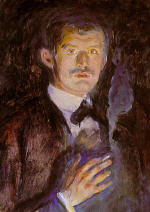
1863-1944. The Norwegian artist Edvard Munch is regarded as a pioneer in the Expressionist movement in modern painting. At an early stage Munch was recognized in Germany and central Europe as one of the creators of a new epoch. His star is still on the ascendant in the other European countries, and in the rest of the world. Munch's art from the 1890s is the most well known, but his later work is steadily attracting greater attention, and it appears to inspire present-day artists in particular. Often called the father of Expressionism, the Norwegian painter suffered as a child with illness, loss, and psychological terror, emotions that characterize many early images. He chose painting as his life's work at a young age and traveled throughout Europe, especially to Paris, where he absorbed the influences of Impressionism, then Post-Impressionism, and Art Nouveau design. While in Berlin, he joined a circle of writers and artists that included playwrights Henrik Ibsen and August Strindberg, who became friends and collaborators. Just as his Scandinavian colleagues, Munch unflinchingly brought the darker side of the human experience to his art.